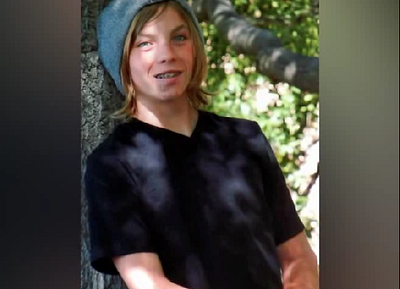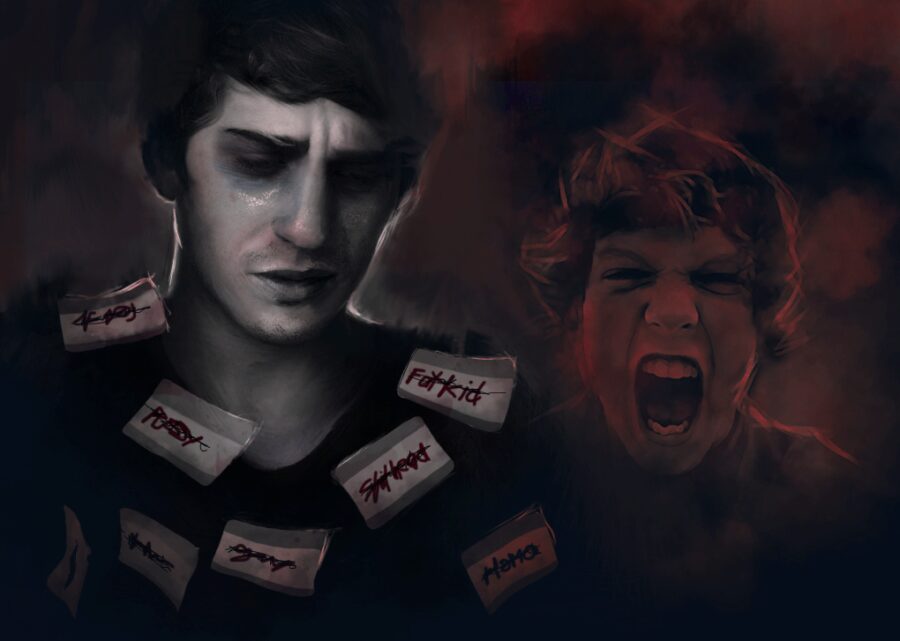Being Bullied is Nothing to Joke About
Victims of childhood bullying suffer long after the bulling ends
Illustration by Jackie Rodriguez
It’s 6:30 a.m. and time to get up for school. I already knew how the day was going to turn out. It would turn out like every other day at middle school where I was sure to get my daily dose of bullying. Sometimes it would begin from the moment I entered the hallway; boys and girls looking at me with menacing grins laughing amongst themselves, or a girl who bumps into me and runs away with disgust like I am vermin, and the worst… the kids who would torment me in class.
Every day I would enter the classroom and the kids already had their eyes set on me. They would take things from my table or steal my backpack when I would leave to use the restroom. They would pass out false love notes to fellow male classmates posing as me, and they would even make fun of my weight. Perhaps one of the most humiliating forms of torment I’ve endured was having my acne treatment cleansing wipes tampered with by a student. I had just returned from the bathroom and I used one of the wipes to clean my face. I had a presentation and as I went up to the front of the class, my face started burning and turned red as a tomato. Seeing my peers laughing, with some confused as to what had happened, felt like the scene in the movie “Carrie.” It wasn’t until later that day that a kid told me a punk named Samuel tampered with my acne treatment while I was in the restroom.
I have suffered this kind of torment since moving to Pomona and switching schools at the age of 6. I’ve always felt alienated from others because I was different from most kids. I spoke properly while other kids spoke slang. I was the first to volunteer for performances while other kids thought it was uncool to sing. I spoke in a manner that caused my peers to classify me as gay. I was more of the artistic type rather than the jock, so it was normal for me to be called names like “gay,” “fag,” “shithead,” “little bitch,” and “pussy.” It didn’t take long for everyone to jump on the teasing bandwagon and from that point on, my life turned to hell. I had toys, jewelry, and supplies stolen from me. I was beaten up for being a pacifist and had lunch thrown at me.I even had a kid threaten to kill me for being gay.
For the longest time I was depressed and as time went on, I started eating away my feelings and gaining weight. I tried getting support from faculty but they didn’t do much to help. The most they did was hold a conference followed by giving the bullies detention but it only made things worse. I couldn’t go to my mom for help because she was having issues with my stepfather. I didn’t know where else to turn and I felt lost and alone.
But I am not alone. According to statistics from the Department of Education, nearly 30 percent of students in the United States are either bullies or victims of bullying, and 160,000 kids stay home from school every day because of fear of bullying. ABC reported in a special 2010 edition called “Bullied to Death in American Schools” that young people who are overweight, gay, or different from the crowd top the list of young people who are bullied the most.
This was the case for Fabio Gonzalez, 20, who was bullied from elementary school to middle school. He was an overweight child, which made it easy for others to pick on him. He endured constant verbal and psychological abuse from other kids. The torment would lead to something more severe when he entered middle school. He was insecure about his looks which made it even harder on him when he reached puberty and started wanting to date girls. Girls would make fun of him, calling him “fat” and for having “manboobs.”
“I just started being very cold towards people and humanity. I didn’t really acknowledge them; I decided I would not tell anyone anything about myself. The least they knew about me the better. So I was just very quiet.”
After experiencing heartbreak from someone he was close to, he decided he didn’t want to be fat anymore. He did whatever he could to slim down, even starving himself. After dieting for a year, girls gave him attention and Gonzalez’s behavor changed. He became what he calls a “man whore.”
“I started thinking, wow, people really are shallow creatures. I’m killing myself and they want me.”
He would sleep with people just to boost his self-esteem, making him feel wanted. His psychiatrist diagnosed him with bulimia that year. He is now living a healthy life and is studying psychology at Mt. San Antonio College. Although it has been years since the bullying took place, he said he still has that voice inside his head that occasionally brings him down.
But for some, it can feel like there is not way out. Some consider suicide as the only escape from the torment of bullying.
For me, the ridicule became so bad in my daily life that I saw no way out of it. I contemplated suicide after watching the film, “The Virgin Suicides.”
My mom found the suicide note I wrote and had saved in case I decided to go through with it, even though I didn’t have a solid plan yet. She showed it to my uncle and he took me out for ice cream and a talk. I let him know what was going on and he assured me that I had back up. He made me realize that I mattered to someone and that gave me the strength to go on. But as I got older, my peers became more violent. Some had ties to gangs and some would just “playfully” hit me because they knew I wouldn’t do anything. My sixth grade teacher called me a “gentle giant.”
Boys in the locker room avoided me because they identified me as a “homo,” and I once again had my life threatened. My mother and aunt were outraged and reported it to the school, but nothing changed.
With peers like these, it was hard to be myself. My story is just one of so many. Each day, children are bullied to the point of harm and many victims who cannot take it anymore end their lives. In the past year alone, 14 students have committed suicide in the United States due to bullying. I am lucky to have had someone intervene or I may not be here to tell this story.

Take the case of Johnathon Short-Scaff, a 13-year-old boy in Ohio who committed suicide after enduring years of bullying for being small. He was bullied mercilessly in middle school, and even told by his bullies to “go kill yourself.” On July 16 of this year, he was found hanged in his bedroom. In the same month, 14-year-old Matthew Burdette committed suicide after classmates at University City High School in San Diego, Calif. tormented him over an embarrassing video of him in the bathroom went viral.

These are just two of the many kids who just couldn’t take it anymore. The Center for Disease Control and Prevention reports that suicide is the third leading cause of death among young people, resulting in about 4,400 deaths per year. Over 14 percent of high school students have considered suicide, and almost 7 percent have attempted it. Bully victims are between two to nine times more likely to consider suicide than non-victims, according to studies by Yale University. A study in Britain found that at least half of suicides among young people are related to bullying, and 10 to 14 year old girls may be at even higher risk for suicide, according to the study.
Bullying is a disease that affects any kid who is unfortunate enough to have a person, or a group of individuals, constantly harassing them. It can take on various forms, from physical bullying to emotional bullying, to psychological bullying or cyber bullying. Each can have an everlasting effect on children and the adults they become. Post Traumatic Stress Disorder PTSD is common among people who have been bullied. Sufferers of PTSD can exhibit symptoms such as fear, anxiety, depression, and in some cases bulimia and anorexia.
Sherrie Gordon writes about this disorder in her article “Bullying can Lead to PTSD. “PTSD can show up in a person’s life long after the bullying has ended,” she writes.
In later life, long after the torment ends, the psychological effects from bullying become so deep it can change a person’s outlook on life. This can result in how the victims feel about themselves, how they present themselves to others, worrying about what others think, and setting unrealistic standards for themselves such as beauty and weight management. A recent study in Norway at the University of Stavanger confirms these long-term affects of PTSD. According to the study, approximately one-third of children who were bullied showed signs of PTSD. The study defines bullying as harassment being carried out over an extended period of time, making the victim feel powerless to stop the emotional and or physical abuse.
The site, Nobullying.com, an online support movement against bullying, reports that the internet has made it much easier to bully people. The site states: “Our increasingly connected world has created another platform for bullies to harass their victims. No longer are bullies confined to picking on other kids on the school playground; today, many bullies are refraining from physical assaults, opting instead for around the clock bashing via email, social media, instant messaging and other online platforms.”
Statistics for 2014 are staggering. Twenty five percent of teenagers report that they have experienced repeated bullying via their cell phone or on the internet. Over half of young people report being cyber bullied. Of the young people who reported cyber bullying incidents , one-third of them reported that their bullies issued online threats. Over half of all teens who use social media have witnessed outright bullying via that medium. The site adds that bullies and cyber bullies often turn to hate speech to victimize their target. One-tenth of all middle school and high school students have been on the receiving end of ‘hate terms’ hurled against them.
In other words, victims are not even safe at home. Health Central reports that social media, cell phones and other electronic communication devices, allows cyberbullying to follow a child home, giving him or her no safe refuge.
The Stavanger study also concluded that bullying affects a student’s academics and ability to do well in school. It reports: “Pupils who are constantly plagued by thoughts about or images of painful experiences, and who use much energy to suppress them, will clearly have less capacity to concentrate on schoolwork. Nor is this usually easy to observe — they often suffer in silence.”
After leaving middle school, I managed to find my place in the social world in high school. Even after graduation, I still keep in touch with my best friends from high school. While the bullying stopped, the traumatic affects remained. I would easily get mad when I was excluded from friends’ gatherings. Even when I was surrounded by people, I still felt alone. And when I was alone, I was even more alone. The thoughts of suicide returned. It wasn’t until sophomore year when a group of my teachers noticed my mood swings and referred me to a psychologist. Slowly, I was able to express myself in a way I was too proud to do in public. I remember the therapist having me say into a tape recorder all of the hurtful things that were said to me in the past, which she would replay. Eventually, after letting out so much anger and depression, I began to get better.
I still have issues with confidence and whenever I feel social anxiety, I tend to not look at people directly in the eyes when making conversation. I’m so used to trying to avoid people and having as little interaction as possible that I sometimes shudder when talking to people. About a year ago, I starved myself to lose weight, eating only in the mornings and dinner. I went from 260 pounds to 230 in a matter of two months. My doctor said for my build I would never be in the 100’s, so weighing 230 pounds was pretty damn close for me. I usually don’t let things from my past get to me, but there a times when I feel that some of the things that were said and done to me are fused into my core. It’s like a scar that never goes away.
It reminds me of a quote from the animated show Fairly Odd Parents— “Sticks and stones may break your bones, but words leave psychological wounds that will never heal.”
Substance is a publication of the Mt. San Antonio College Journalism Program. The program recently moved its newsroom over to Medium as part of a one-year experiment. Read about it here.







